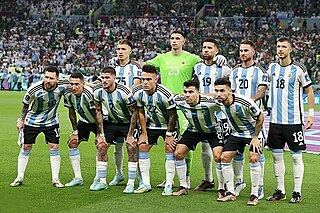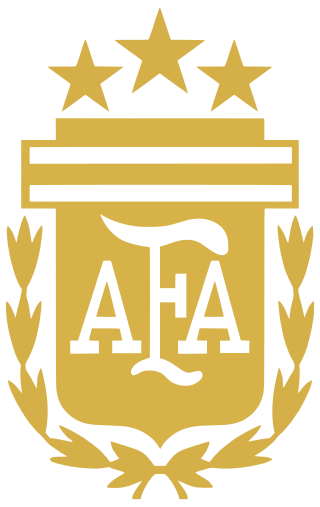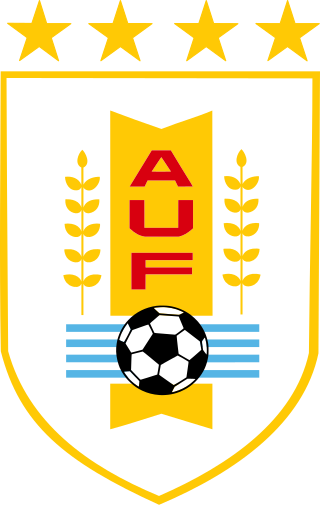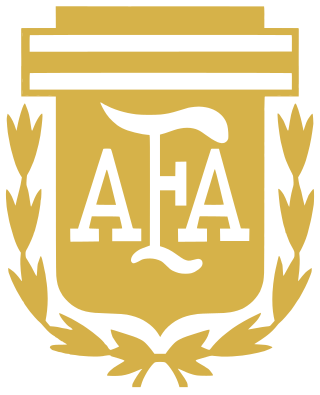Related Research Articles

The FIFA World Cup, often called the World Cup, is an international association football competition among the senior men's national teams of the members of the Fédération Internationale de Football Association (FIFA), the sport's global governing body. The tournament has been held every four years since the inaugural tournament in 1930, with the exception of 1942 and 1946 due to the Second World War. The reigning champions are Argentina, who won their third title at the 2022 tournament.

The Brazil national football team, nicknamed Seleção Canarinho, represents Brazil in men's international football and is administered by the Brazilian Football Confederation (CBF), the governing body for football in Brazil. They have been a member of FIFA since 1923 and a member of CONMEBOL since 1916.

The Argentina national football team, nicknamed La Albiceleste, represents Argentina in men's international football and is administered by the Argentine Football Association, the governing body for football in Argentina.

The Uruguay national football team, nicknamed La Celeste, represents Uruguay in international men's football, and is administered by the Uruguayan Football Association, the governing body for football in Uruguay.

The Bolivia national football team, nicknamed La Verde, has represented Bolivia in men's international football since 1926. Organized by the Bolivian Football Federation (FBF), it is one of the ten members of FIFA's South American Football Confederation (CONMEBOL).
The Uruguayan Football Association is the governing body of football in Uruguay. It was founded in 1900, as The Uruguayan Association Football League, and affiliated to FIFA in 1923. It is a founding member of CONMEBOL and is in charge of the national men's team and the national women's team, as well as the Uruguayan football league system.

The Russia women's national football team represents Russia in international women's football. The team is controlled by the Russian Football Union and affiliated with UEFA. Yuri Krasnozhan replaced Elena Fomina as coach of the team in December 2020.

The Argentina women's national football team represents Argentina in international women's football. Like their men's counterpart, the women's team has been known or nicknamed "La Albiceleste".
The 2003 South American Women's Football Championship was the fourth staging of the South American Women's Football Championship and determined the CONMEBOL's qualifiers for the 2003 FIFA Women's World Cup. The tournament was held between 9 and 27 April.
The Uruguay women's national football team represents Uruguay in international women's football.

Football is the most popular sport in Costa Rica. Costa Rica has long been considered an exporter of footballers within Central America, with 19 players in European professional football leagues during 2006. The newspaper, La Nación, has prepared an annual census of these "Legionnaires" since 1994.
Rodrigo Javier Lemos Rosende is a Uruguayan former footballer. He last played for Centro Deportivo Social Liverpool, a semi-amateur team from Canelones, Uruguay.
Stefanía Teresa Maggiolini Fort is a Uruguayan football manager and former player, who played as a defensive midfielder. She has been a member of the Uruguay women's national team. She currently manages the women's under-19 team of Defensor Sporting.

The 2018 FIFA U-17 Women's World Cup was the sixth edition of the FIFA U-17 Women's World Cup, the biennial international women's youth football championship contested by the under-17 national teams of the member associations of FIFA, since its inception in 2008.

Orianica Velasquez Herrera is a Colombian footballer who plays as a left back for Atlético Junior and the Colombia women's national team.

Paolo Mauricio Lemos Merladett is a Uruguayan professional footballer who plays as a centre-back for Campeonato Brasileiro Série A club Atlético Mineiro and the Uruguay national team.
Yamila Badell Graña is a Uruguayan footballer who plays as a forward for Spanish Primera Federación club Real Oviedo and the Uruguay women's national team. She is the first player in her country to score in a FIFA U-17 Women's World Cup.
The 2020 South American U-17 Women's Championship was originally going be the seventh edition of the South American Under-17 Women's Football Championship, the biennial international youth football championship organised by CONMEBOL for the women's under-17 national teams of South America. It was scheduled to be held in Uruguay between 15 April and 3 May 2020, before its suspension and subsequent cancellation due to the COVID-19 pandemic.
María Natalia Mauleón Piñón is a Mexican professional footballer who plays as an attacking midfielder for Liga MX Femenil side Club América and the Mexico women's national football team.
Mackenzie Dale Barry is a football player who has represented New Zealand at U-17 and Under-20 age group levels and the senior New Zealand women's national football team. She plays club football for Wellington Phoenix FC in Australia's A-League Women competition.
References
- 1 2 "FIFA Player Statistics: Gessika LEMOS". FIFA.com. Archived from the original on 1 July 2013. Retrieved 30 November 2020.
- ↑ "La Selección de fútbol femenino debuta mañana" (in Spanish). 10 April 2003. Retrieved 30 November 2020.
